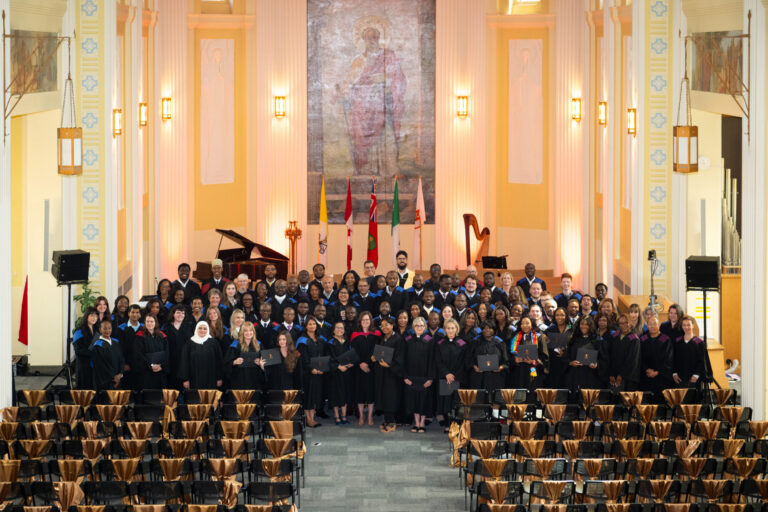This Spring, Saint Paul University hosted 25 aspiring social innovators, to collaborate in a two-week global social innovation lab (SIL) focused on addressing pressing social challenges. The participants included students from SPU, as well as students and social entrepreneurs from 5 other institutions from Europe, Asia and South America.
Over the course of the SIL, each participant group received instruction and mentorship in how to develop entrepreneurial ideas that offer effective solutions to social challenges. Participants were encouraged to use the Sustainable Development Goals proposed by the United Nations, international concepts and global best practices as inspiration for their projects.
The SIL was spearheaded by Tatjana Brkic, a doctoral candidate pursuing a PhD in Interdisciplinary Research and Founder of Solutions for a Sustainable Future, in partnership with SPU’s Élisabeth-Bruyère School of Social Innovation and the Mauril-Bélanger Workshop for Social Innovation (The Atelier).
“Global problems require global action,” explains Brkic. “The objective of this social innovation lab was to bring participants from different regions and disciplines together to create socially innovative entrepreneurial ideas that address a sustainable development goal of their choosing. In this way, they can share regional perspectives and disciplinary knowledge in order to start social enterprises in different geographies simultaneously.”
To facilitate global partnership and collaboration, the participants were organized into teams that included aspiring social entrepreneurs from each institution.
The SIL resulted in four unique socially innovative ideas, each of which tackled diverse development goals, including education, social justice, health and well-being.
“Since the social innovation lab has ended, I have received a lot of positive feedback from participants,” shared Brkic. “Some of the groups are continuing to develop their projects, using the knowledge, tools and connections they made during the lab.”
With the success of this project, Brkic hopes to establish an ongoing series of SILs to further encourage international cooperation, knowledge sharing and project incubation. In this series, participating universities, SPU and The Atelier play a crucial role.
“Saint Paul University is uniquely positioned to spearhead global innovation,” explains Brkic. “Its partnership with the Atelier and its socially engaged student population create an action-orientated social innovation environment. It’s unlike anywhere I have worked and studied.”
Brkic’s foundation, Solutions for a Sustainable Future, and the Atelier provided this lab to all participants free of charge. This was made possible through financial support from SPU, the Social Sciences and Humanities Research Council of Canada (SSHRC) and Mitacs, as well as the active support engagement of her advisors Dr. Amanda Wilson and Dr. Jamel Stambouli, both professors in the Élizabeth-Bruyère School of Social Innovation.

Small Enterprises, Sustainable Futures
The implementation of the social innovation lab is an extension of Brkic’s broader research focus on global social entrepreneurship education.
“We often hear about how larger institutions, businesses and governments can contribute to tackling global issues, but we must not forget about the important role of social entrepreneurs” shared Brkic. “Social entrepreneurs typically operate small businesses or not-for-profits, which are a big part of local economies and community-focused initiatives. Many social enterprises are making a positive impact by implementing socially innovative and environmentally sustainable business models.”
Through her research, she hopes to develop innovative educational approaches to equip those who want to create positive social and environmental impact to create and successfully operate social enterprises globally.
“By finding common elements and leveraging best practices in academia, research and social entrepreneurship practice, we will be better able to scale socially innovative entrepreneurial solutions and unite communities around the world in creating a positive global impact,” shared Brkic.
For more information, please contact:
Julie Bourassa
Communications Officer, Saint Paul University
613-236-1393, ext. 2310
jbourassa@ustpaul.ca
